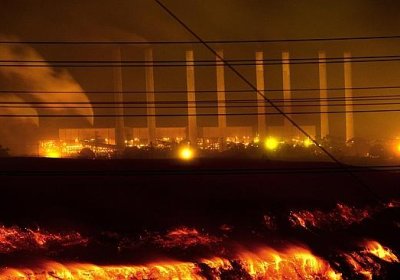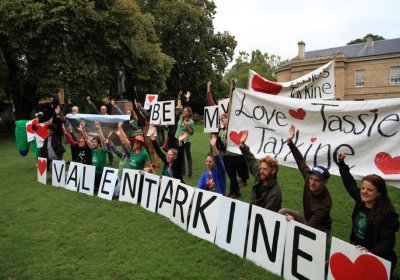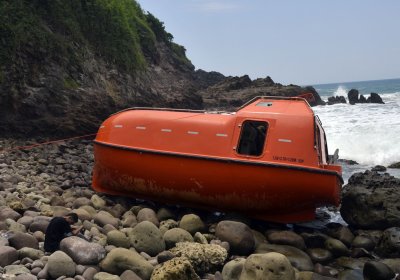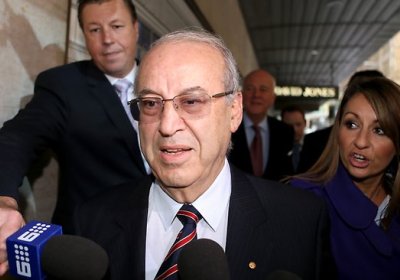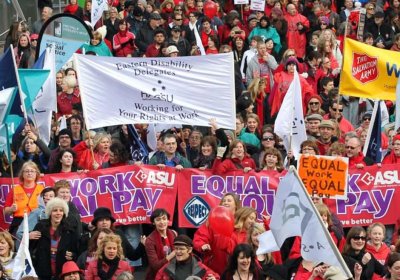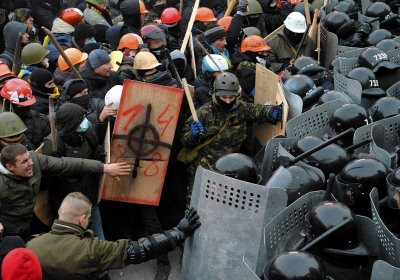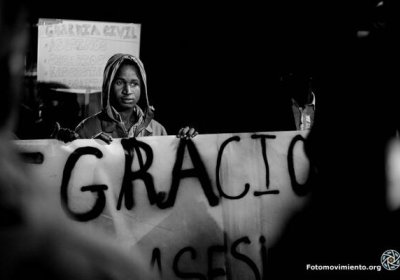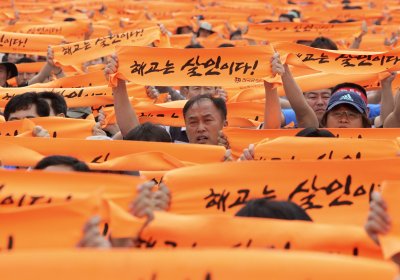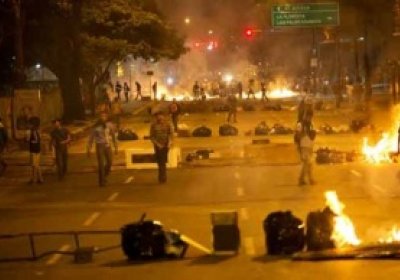New at LINKS International Journal of Socialist Renewal. Party of the European Left: building unity to build hope and Noam Chomsky's weak spot on political power.
Issue 999
News
Members of the National Tertiary Education Union (NTEU) on University of Western Sydney campuses took action on February 28 to highlight management's refusal to agree to a fair enterprise agreement. They have been without an agreement for more than a year.
On the Bankstown campus of UWS, a number of unionists and students gathered to hear from union activists.
They said that after 12 months of meetings with management they felt that little progress had been made. In the meantime, they were having to deal with increased workloads and increases in the cost of living.
A historic motion for Ballarat was put forth to affirm support for a “No to Homophobia” campaign at a City of Ballarat council meeting on Febraury 12. The motion was carried unanimously.
Greens councillor Belinda Coates put the motion. She said after the meeting: “It was fantastic to get unanimous support for this motion to affirm support for the 'No to Homophobia' campaign and their 'Promise' campaign.
Victorian Premier Denis Napthine is living up to his new nickname, “Naptime”, as the Hazelwood coalmine fire continues its terrible impact on the town of Morwell in the Latrobe Valley.
The edge of the town is only a few hundred metres from where the fire has been burning since February 9. The plume of toxic smoke and ash from the fire has been blanketing the town.
The Tarkine wilderness in north-west Tasmania is under threat from iron ore mining.
The National Tarkine Coalition took Perth-based exploration firm Venture Minerals and the Tasmanian state government to the federal court last month to challenge a proposed iron ore mine at Riley Creek in the Tarkine.
About 140 people attended Manningham City Council’s forum on February 20 to hear speakers discuss the case for a railway line to Doncaster, Victoria.
Doncaster Rail has been promised since the late 1890s and Manningham City, comprising 10 suburbs and only 12 kilometres from the CBD, is the only Melbourne municipality without a railway line even though it is a rapidly growing area.
At the 2011 Census, Manningham had a population of 111,300.
A byelection was held in the Queensland state seat of Redcliffe on February 22, following the resignation of the sitting Liberal National Party member, Scott Driscoll, over fraud allegations.
The result was a 17% swing to Labor, and the election of the Labor candidate Yvette D’Ath. The Greens were also hurt by this swing; they failed to reach the 4% threshold to get electoral funding.
Members of the Socialist Alliance have taken part in O-week stalls, which is not only resulting in a boost for Green Left Weekly sales and subscriptions in the lead up to its 1000th issue, but also a boost for the Socialist Alliance and Resistance.
Qantas is just the latest big company to announce it is about to destroy thousands of jobs. CEO Alan Joyce says jobs have to go to save the company’s profit line.
We've heard the same sob story from Ford, Holden, Coca-Cola, Toyota and Alcoa all over a relative short period of time. Can we really believe these corporations, with their “creative” accounting and webs of subsidiaries and business partners?
All these companies have received large amounts of public subsidies and Qantas, privatised two decades ago, was built with public funds.
Police have not responded to a petition Taser victim Sheila Oakley handed to them a week ago. In response, a community assembly was held outside Logan police station on February 22.
Oakley was in hospital and could not attend the rally. Paul Butterworth, an Aboriginal elder who had called the assembly, told the crowd: “We will keep coming back until something’s done about this.”
He also said harassment of the local community continued, including children in Oakley’s family. Oakley’s brother expressed his thanks for the support they were receiving.
Terry Barnes, a former adviser to Prime Minister Tony Abbott, is credited with coming up with the bright idea of introducing a $6 payment when people visit their GP.
After Barnes left the prime minister’s employ, he wrote a submission to the government’s Commission of Audit on behalf of the Australian Centre for Health Research, a right-wing think-tank set up by a private health insurer, proposing the extra charge for GP visits. He claimed that it would save $750 million over four years.
Analysis
Two important things were revealed when immigration minister Scott Morrison was finally forced to admit he had been wrong about most of the facts when one man was killed and at least 70 others were injured on Manus Island on February 16.
The first was that asylum seekers who rang and messaged advocates, supporters and friends in Australia in a panic over the outbreak of violence, saying that G4S security guards and angry locals were brutally attacking dozens of people, were telling the truth.
Outside the city of Port Augusta in South Australia, the firm Alinta Energy runs the ageing brown coal-fired Northern power station. Environmentalists and local campaigners want the plant replaced with state-of-the-art solar power generation. But Alinta would rather solar power were used to pre-heat water for the existing plant, which would then stay in operation for further decades.
Well the fun just never stops, does it, when it comes to the Abbott government’s asylum seeker policies, or as they call it, “border protection”. Because when it comes to needing protection, fleeing war, torture and genocide is one thing, but won’t someone think of all the poor, downtrodden borders?
How many more times must our vulnerable borders be subject to assaults by desperate people using their international right under a convention Australia has signed to sail right over them in their boats without so much as a “Sorry Australian maritime borders! Didn’t see you there!”
“You don't want a wimp running border protection,” Prime Minister Tony Abbott said on February 21. “You want someone who is strong, who is decent, and Scott Morrison is both strong and decent.”
Abbott was defending immigration minister Scott Morrison for his actions and comments after a young asylum seeker was killed in the Manus Island detention centre on February 16.
An anonymous post to the Facebook group “Parenting Payments for Parents — not Newstart” (PPPNN) on February 26 read: “It’s been a very long, long, tiring road with no help from police regarding the violence ... I am now settled in a new private rental of $355 a week but I just can’t get back on track … I can’t put food on the table or nappies on my children’s bottoms this week.
Institutionalised corruption in New South Wales stretches from the Rum Corps of the late 18th century to present-day politicians from the Labor and Liberal parties.
The pattern has been consistent: public exposure, followed by the confected outrage of “shocked” politicians that comes with contrite promises of reforms. After a suitable time has elapsed, the cycle repeats.
As approaches its 1000th issue, more than 20 years after it first hit the streets, we will be looking back at some of the campaigns it has covered and its role as an alternative source of news. This week we look at women's liberation.
***
World
The governments of the United States, Europe and Canada are working furiously to help consolidate the conservative and rightist government that has come into office in Ukraine after the overthrow of the authoritarian regime of Victor Yanukovych 10 days ago.
The overthrow of the regime came about through a confluence of mass protests against its authoritarian rule and retrograde social and economic policies, and a very active intervention by right-wing and fascist political forces.
With few exceptions, most international media coverage of the recent protests in Venezuela gives little sense of the response from the popular social movements who support the government of President Nicolas Maduro but operate independently from it.
As researchers who have carried out long-term fieldwork in the urban barrios (poor neighbourhoods) of Caracas, we felt compelled to translate and publish the statement of one of these barrio groups.
Cusco, a city of 400,000 in south-eastern Peru, was totally paralysed on February 25. It was the first day of a 48-hour general strike initiated by trade unions and other civic groups.
The strike was supported by bus, taxi and truck drivers, as well as peasant and indigenous groups in provinces throughout the Cusco region. All vehicular traffic ceased in the downtown area and citizens walked freely through the streets ― an unusual sight in a South American city.
A new report by eight international trade unions and non-government organisations details the brutal government repression Cambodian garment workers were subjected to. It said the workers' demand to raise the minimum wage were reasonable.
Indiscriminate violence against ordinary people, whether they be involved in politics or not, is always appalling and serves no progressive or democratic purpose. The recent killing of children is even worse.
We have no idea who has been committing these latest deadly atrocities in Bangkok or in Trat and it would be foolish to make wild guesses. It could be those who favour a dictatorship and wish to create conditions favourable for a military coup against elected President Yingluck Shinawatra.
Venezuelan car workers have slammed multinational car manufacturers for cutting back production in the country. The country's largest trade union federation has called for the industry to be nationalised.
Accusing multinational car companies of being “imperialist”, the National Workers' Union (UNT) has called on the government to place car factories under worker control.
The UNT said: “It's clear that building socialism relies on the working class, indeed the workers' control of the factories.”
Almost a year has passed since the death of Hugo Chávez on March 5, 2013. Arguably this has been the most difficult one for the Bolivarian Revolution. Many people, both on the left and the right expressed doubt that there could be Chavismo without Chávez.
Perhaps a year is still too short of a period to assess the situation after Chávez’s passing. Yet, the dynamic developments over the past twelve months call for some preliminary remarks.
Throughout March, the United Nations Human Rights Council (UNHRC) will be reviewing the human rights situation in Sri Lanka, among other countries, at it meeting in Geneva.
At last year’s session, the UNHRC passed a resolution calling on the Sri Lankan government to “conduct an independent and credible investigation into allegations of violations of international human rights law and international humanitarian law”.
The armed group Basque Country And Freedom (ETA has made a significant step towards decommissioning the weapons used in its campaign for independence and freedom, Irish Republican News said on February 21. But the Spanish government immediately rejected the move.
The decommissioning by ETA of some its cache of weapons and explosives, drawing a definitive line under decades of bloody conflict, was confirmed by an International Verification Commission.
After failing to violently crush mass protests in Kiev’s Independence Square, which have been raging since November 21, the regime of Viktor Yanukovich collapsed on February 22.
The protests began in opposition to Yanukovich’s decision to back out of a Free Trade Agreement and Association Agreement with the European Union. But in the face of police brutality, the protests evolved into a general expression of anti-regime discontent. The movement was initially known as Euromaidan (“Eurosquare”) but later just Maidan, reflecting this evolution.
In a closely-watched election, the United Autoworkers Union (UAW) tried to break into the anti-union South to organise a Volkswagen plant in Chattanooga, Tennessee.
The union lost the February election among the plant’s 1550 production workers. There were 626 votes in favor and 712 against.
The negative vote was something of a surprise, because Volkswagen management did not threaten workers’ jobs if they voted yes, and was officially neutral. Generally, bosses intimidate workers and pay for a barrage of anti-union advertising to stop workers voting in favour of unionising.
At quarter to six on the morning of February 6, in a wood on the Moroccan side of the border with the Spanish north African enclave Ceuta, about 300 asylum seekers met to try to cross the six-metre high razor-wire fence seperating the two countries.
Four days of talks in Singapore for the proposed TransPacific Partnership (TPP) ended inconclusively on February 25.
It is clear big disagreements still exist between the negotiating countries. Combined with unease among the populations in negotiating countries, this is likely to prevent the deal being finalised this year.
Seoul's High Court ruled on February 7 in favour of the 153 members of the SsangYong Motor Company branch of the Korean Metal Workers Union who were unlawfully laid-off in 2009.
At the trial, Chief Justice Cho Hye-hyeon ordered the car company to re-instate all the workers and pay each about $1000 in compensation. The court decision was met with tears of joy from workers and their families.
In response to the violence instigated by the Venezuelan elite, the working classes of Venezuela took to the streets this week. They went out not with pistols or grenades, but with brooms and shovels to clean the burnt trash and remove the barricades that have restricted the free movement of thousands of citizens.
Millions of dollars worth of damages to public property may have been caused by a wave of violence across Venezuela, according to government sources.
The assessment comes after Venezuelan President Nicolas Maduro called for a “National Peace Conference” as a means of resolving the on-going violent opposition protests in Venezuela.
Protests began two weeks ago after opposition leader Leopoldo Lopez called supporters onto the streets to force the “exit” of President Nicolas Maduro. Lopez is currently in custody and being investigated for inciting violent acts.
Culture
For Neville Cunningham
You walk, you walk,
You turn a corner and walk some more
The sun might be there
Some cloud also welcome
But you are always invited
Into the house of the beekeeper.
You will know it when you arrive
Usually an afternoon of daylight
Will warm those neighbourhood bricks
You will feel it on your right cheek!
You’ll know you’ve arrived:
A poster of Ned Kelly hangs in his window
The front door is always open when he’s in
And you can go in once you tap on the screen door.
He’ll be reading a book on his thin mattress
The Prince: Faith, Abuse & George Pell
David Marr
Quarterly Essay, Issue 51
Black Inc., $19.99 (pb)
The police had, writes David Marr in his September 2013 Quarterly Essay on paedophile priests in the Catholic Church in Australia, “vigorously, for a very long time, protected the church”. This, says Marr, left the clergy’s sex crimes to be looked after in-house.
This entirely suited the clerical child abusers, until the global tide of Catholic sexual abuse revelations engulfed Australia and sparked police of conscience into action.
Radical Dilemma
Rebel Diaz
Released December 4, 2013
www.rebeldiaz.bandcamp.com
Rebel Diaz's much-anticipated debut album tackles a quandary faced by many activists - the "radical dilemma" of trying to change the system while being trapped in it. Green Left Weekly's Mat Ward spoke to the Bronx-based activist rap duo, made up of brothers RodStarz and G1.
***

